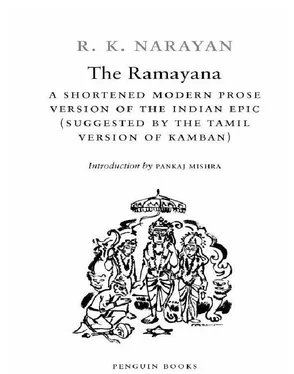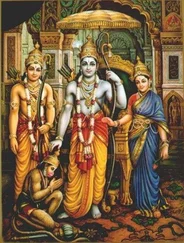Махариши Вальмики - The Ramayana
Здесь есть возможность читать онлайн «Махариши Вальмики - The Ramayana» весь текст электронной книги совершенно бесплатно (целиком полную версию без сокращений). В некоторых случаях можно слушать аудио, скачать через торрент в формате fb2 и присутствует краткое содержание. Жанр: Старинная литература, на английском языке. Описание произведения, (предисловие) а так же отзывы посетителей доступны на портале библиотеки ЛибКат.
- Название:The Ramayana
- Автор:
- Жанр:
- Год:неизвестен
- ISBN:нет данных
- Рейтинг книги:3 / 5. Голосов: 1
-
Избранное:Добавить в избранное
- Отзывы:
-
Ваша оценка:
- 60
- 1
- 2
- 3
- 4
- 5
The Ramayana: краткое содержание, описание и аннотация
Предлагаем к чтению аннотацию, описание, краткое содержание или предисловие (зависит от того, что написал сам автор книги «The Ramayana»). Если вы не нашли необходимую информацию о книге — напишите в комментариях, мы постараемся отыскать её.
The Ramayana — читать онлайн бесплатно полную книгу (весь текст) целиком
Ниже представлен текст книги, разбитый по страницам. Система сохранения места последней прочитанной страницы, позволяет с удобством читать онлайн бесплатно книгу «The Ramayana», без необходимости каждый раз заново искать на чём Вы остановились. Поставьте закладку, и сможете в любой момент перейти на страницу, на которой закончили чтение.
Интервал:
Закладка:
“Oh!” groaned the King. “How, how . . . When?” He could not complete the sentence. Sumanthra tried to say, “Rama wanted to escape the crowd. . . .”
The thought of Rama and Sita on the rough forest track beyond bamboo clusters was too unbearable for Dasaratha. He fell into a swoon and never recovered from the shock. (“He died even as Sumanthra was speaking,” says the poet.)
The King’s death left the country without a ruler for the time being. Vasishtha convened an urgent council of the ministers and officials of the court and decided, “The first thing to do is to preserve the King’s body until Bharatha can come back and perform the funeral.” They kept the body embalmed in a cauldron of oil.
Two messengers were dispatched with a sealed packet for Bharatha, advising him to return to the capital urgently. The messengers were to keep their horses continously at a gallop, and were not to explain anything or convey any information. They were trusted men, experienced in the task of carrying royal dispatches, and could be depended upon not to exceed their orders. Within eight days, they drew up at the portals of Aswapathi’s palace at Kekaya and declared, “We carry an important message for Bharatha.”
Bharatha was overjoyed, and ordered, “Bring them up with the least delay.” He received them in his chamber and asked at once, “Is my father happy and in good health?” The messengers murmured a polite answer, and Bharatha, “How is my brother, Rama?” And they repeated their polite murmuring again, and said, “We bear an epistle for Your Highness.” Bharatha received the sealed message (written on palm leaf and wrapped in silk), opened it, and read: “Your return to Ayodhya is urgently required in connection with state affairs.” He ordered that the message bearers be rewarded liberally and began immediate preparations for his return to Ayodhya, without having the patience even to consult the palace astrologer as to the propitious time for starting on a long journey.
When they reached the outskirts of Ayodhya, Bharatha asked his brother Sathrugna, “Do you notice any change in the atmosphere?”
“No traffic of chariots or horse-riders, no spectacle of people moving about in public squares and highways . . .”
“Streets and homes without any illumination.”
“No sound of music—no happy voices or songs or instruments . . . What oppressive silence! So few to be seen in the streets, and even the one or two we meet look up with such un-smiling faces! What is wrong with them?”
Bharatha drove straight to Dasaratha’s palace, went up, and burst into his chamber with words of greeting on his lips. Not finding the King in his usual place, he paused, wondering where he should seek him. Just then an inner door opened, a maid appeared and said, “Your mother summons you.” Immediately he left for Kaikeyi’s apartment. He made a deep obeisance to her, touched her feet, and Kaikeyi asked, “Are my father, brothers, and the others safe and happy in Kekaya?”
Bharatha replied that all was well in her father’s home. He then asked, “I want to touch the lotus feet of my father. Where is he gone? Where can I seek him?”
“The great King has been received by resplendent heavenly beings in the next world. He is happy and at peace. Do not grieve,” replied Kaikeyi calmly.
When he took in the full import of her news and found his tongue again, Bharatha said, “None but you could have uttered these terrible words in this manner. Is your heart made of stone? I should never have left his side. My misfortune, my mistake. The world has not seen a greater ruler; no son has had a nobler father. I was not fated to be with him, to hear his voice, to feel his glorious presence—enjoying my holiday indeed! What a time to have chosen for relaxation!” He recounted again and again his father’s exploits as a warrior, and this in some measure mitigated his anguish. After a long brooding silence he said, “Until I see Rama and listen to his voice, my grief will not abate.”
At this point, Kaikeyi said in a matter-of-fact voice, “With his wife and brother, he left to live in the forests.”
“What a time to have chosen for forest-going! When will he be back? What made him go? Did he go there before the King’s death or after? Has he committed a wrong? What could be the cause of his exile, if it is an exile? Did the gods decree it or the King? Did he go before or after the King’s death? Oh, impossible thought—did he commit a wrong? But if Rama committed a seemingly wrong act, it would still be something to benefit humanity, like a mother forcibly administering a medicine to her child.”
“It’s none of what you think. He went away with the full knowledge of your father.”
“My father dies, my brother is exiled. . . . What has happened? What is all this mystery? What is behind all this?”
“Now attend to what I am going to say, calmly and with good sense. Of course, it would have been splendid if your father had lived. But it was not in our hands. You will have to accept things as they come and not let your feelings overpower and weaken your mind. Through your father’s irrevocable promise to grant me two wishes, you are today lord of this earth, and Rama has willingly removed himself from your path. After he gave me his promise, your father became rather weak in mind. . . .”
Bharatha understood now. He ground his teeth, glared at her and thundered, “You are a serpent. You are heartless. You have had the cunning, the deviousness, to trap the King into a promise, and not cared that it meant death to him. How am I to prove to the world that I have no hand in this? How can anyone help thinking that I have manoeuvered it all through? . . . You have earned me the blackest reputation for anyone since the beginning of our solar race.”
He concluded with regret, “You deserve to die for your perfidy. . . . If I do not snuff your wretched life out with my own hand, do not pride yourself that it is because you are my mother, but you are spared because Rama would despise me for my deed.”
He left her without another word and went off sobbing to the palace of Kausalya, Rama’s mother. She received him with all courtesy and affection, although she could not be quite clear in her mind about Bharatha’s innocence. Bharatha threw himself before her and lamented, “In which world shall I seek my father? Where can I see my brother again? Have the fates kept me away in my grandfather’s house so that I may suffer this pang?”
After he had gone on thus for some time expressing his sorrow and his determination to destroy himself rather than bear the burden of both separation and ill-repute, Kausalya realized that Bharatha was innocent. She asked at the end of his speech, “So you were unaware of the evil designs of your mother?”
At this Bharatha was so incensed that he burst into self-damnation: “If I had the slightest knowledge of what my mother was planning, may I be condemned to dwell in the darkest hell reserved for . . .” And he listed a series of the blackest sins for which people were committed to hell.
Vasishtha arrived. Bharatha asked, “Where is my father?” He was taken to where the King’s body was kept.
Vasishtha said, “It is time to go through the funeral rites.” When Bharatha was ready for the ceremonies, Dasaratha’s body was carried in a procession on elephant back to the accompaniment of mournful drums and trumpets, to the bank of the Sarayu River, where a funeral pyre had been erected. Dasaratha’s body was laid on it with elaborate prayers and rituals. When the time came to light the pyre, Bharatha approached it with a flame in his hand; suddenly, at the last moment, Vasishtha stopped him, remembering Dasaratha’s last injunction disowning Kaikeyi and her son. He explained it delicately and with profound sorrow: “The most painful duty that the gods have left me to perform.”
Читать дальшеИнтервал:
Закладка:
Похожие книги на «The Ramayana»
Представляем Вашему вниманию похожие книги на «The Ramayana» списком для выбора. Мы отобрали схожую по названию и смыслу литературу в надежде предоставить читателям больше вариантов отыскать новые, интересные, ещё непрочитанные произведения.
Обсуждение, отзывы о книге «The Ramayana» и просто собственные мнения читателей. Оставьте ваши комментарии, напишите, что Вы думаете о произведении, его смысле или главных героях. Укажите что конкретно понравилось, а что нет, и почему Вы так считаете.












